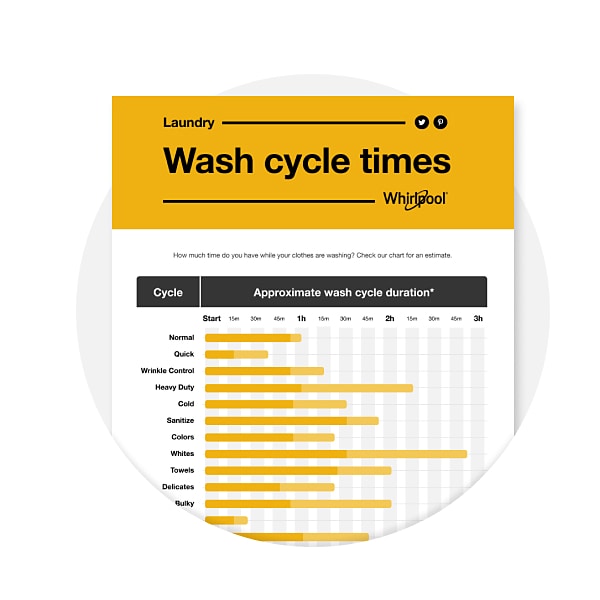Have you ever tossed a load of laundry into your washer, only to find yourself staring at the clock, wondering, “How long does this washer actually take?” You’re not alone.
With so many different types of washing machines on the market, it’s easy to feel a bit overwhelmed when trying to figure out the time commitment for each cycle. This uncertainty can lead to frustration, especially when you’re trying to manage a busy schedule.
But don’t worry—this article is here to clear up the confusion. We’re going to dive into the factors that determine wash cycle times, helping you plan your laundry day with ease. Ready to take control of your laundry routine? Let’s get started!

Credit: cleanerdigs.com
Types Of Washer Cycles
Ever wondered how long a washing cycle takes? Different washer cycles cater to diverse needs. Each cycle varies in duration and function. Knowing the types of washer cycles can help you select the best option for your laundry needs. Let’s delve into the main types of washer cycles and understand their unique features.
Normal Cycle
The normal cycle is the most common setting. It balances washing time and cleanliness. Typically, it lasts between 45 to 60 minutes. This cycle handles everyday clothing like t-shirts and jeans. It uses warm water for effective cleaning. The normal cycle is ideal for regular laundry loads.
Heavy-duty Cycle
The heavy-duty cycle tackles tough stains and bulky items. This cycle can last 75 to 120 minutes. It uses hot water and a strong spin. Ideal for towels, bed linens, and heavily soiled clothes. This cycle ensures deep cleaning. It might take longer but provides thorough results.
Quick Wash Cycle
Pressed for time? The quick wash cycle is your answer. It completes in 15 to 30 minutes. This cycle is perfect for lightly soiled clothes. It uses less water and energy. Quick but efficient. Great for small loads and last-minute needs.
Delicate Cycle
The delicate cycle cares for fragile fabrics. This cycle usually lasts 45 to 60 minutes. It uses cold water and a gentle spin. Best for silk, lace, and lingerie. Protects items from damage. The delicate cycle offers a soft touch for sensitive materials.
Factors Affecting Cycle Duration
Understanding how long a washer takes can be tricky. Various factors influence the duration of each cycle. Knowing these can help manage laundry time better.
Load Size And Type
Load size impacts cycle duration. Larger loads take more time to wash thoroughly. Heavy fabrics like towels need longer cycles. Delicate items might need shorter cycles to prevent damage.
Water Temperature
Water temperature plays a crucial role. Hot water requires longer heating times, extending the cycle. Cold water cycles are generally quicker. Choosing the right temperature can optimize washing time.
Machine Efficiency
Machine efficiency affects how long washing takes. High-efficiency washers use less water and energy. They complete cycles faster than older models. A modern machine can save time and resources.
Comparing Front-load And Top-load Washers
Choosing between front-load and top-load washers can feel like a tough decision. Each type has its own benefits and drawbacks, especially when it comes to cycle times. Understanding these differences can help you make a better choice for your laundry needs. Let’s dive into how these machines stack up against each other.
Cycle Time Differences
Front-load washers generally take longer to complete a cycle compared to top-load washers. The average cycle time for a front-load machine ranges from 60 to 90 minutes. This is because they are designed to be more thorough with cleaning, using less water and energy.
On the other hand, top-load washers can finish a cycle in about 30 to 45 minutes. While quicker, the shorter cycle time may not clean clothes as thoroughly. If you’re in a rush, you might appreciate the speed, but consider whether faster is always better for your laundry.
Efficiency Considerations
Front-load washers are often more energy-efficient. They use less water, which can lead to savings on utility bills over time. Despite longer cycle times, their efficiency might make them an attractive option for your home.
Top-load washers, while quicker, tend to use more water and energy per cycle. If conserving resources is a priority for you, this might be a point to consider. However, the upfront cost of front-load models can be higher, so weigh these factors carefully.
Have you ever thought about how your laundry habits affect your choice? If you frequently wash large loads or heavier items, a front-load washer might be more suitable. But if you mainly wash smaller loads, a top-load’s speed could be more beneficial.
Ultimately, the decision comes down to balancing cycle times and efficiency. What matters most to you: speed or resource-saving? Understanding these differences could be the key to simplifying your laundry routine.

Credit: catrionajeffries.com
Energy Consumption And Cycle Length
Washer cycle length impacts energy use. Shorter cycles save electricity but may not clean thoroughly. Longer cycles use more power but clean better. Choose wisely based on your needs.
Understanding the energy consumption and cycle length of your washer can be a game-changer for both your wallet and the environment. You might be surprised at how much these factors can impact your utility bills and the planet. Many of us just press start without considering the implications of the cycle we choose. Let’s dive into the details and see how you can make smarter decisions for your laundry routine.Impact On Utility Bills
Have you ever noticed a spike in your utility bills and wondered why?The length of your washer’s cycle plays a significant role here. Longer cycles generally mean more energy and water usage. Shorter cycles, while quicker, might not always be suitable for heavily soiled clothes.Choosing the right cycle means balancing the need for cleanliness with the cost. It might be helpful to track your utility bills and cycle choices for a month. You might discover patterns that can help you save money.Eco-friendly Wash Options
Are you keen on reducing your carbon footprint?Many modern washers offer eco-friendly wash options that consume less energy. These cycles are designed to use lower temperatures and less water. While they might take a bit longer, the energy savings can be substantial.Consider using cold water cycles for lightly soiled clothes. This small change can lead to significant environmental benefits. It’s a simple switch that makes a big difference.By being mindful of your washer’s energy consumption and cycle length, you can better manage your utility costs and contribute to a healthier planet. Next time you do laundry, think about the options you choose and the impact they have. You have the power to make a change, one load at a time.
Tips To Optimize Washer Cycles
Ever wondered if your laundry routine could be more efficient? Optimizing washer cycles can save you time and energy, making laundry day less of a chore. Let’s explore practical tips that can help you get the most out of your washing machine.
Choosing The Right Cycle
Do you often default to the ‘Normal’ cycle on your washer without much thought? Choosing the right cycle is crucial for efficient washing. Each cycle is designed for specific fabric types and soil levels. For instance, ‘Delicate’ is perfect for fragile fabrics, while ‘Heavy Duty’ tackles tough stains. By choosing the right cycle, you ensure clothes get cleaner and your washer doesn’t work overtime.
Balancing Load And Time
Are you cramming your washer to the brim? Overloading can lead to longer wash times and less effective cleaning. Balancing your load is key. Aim to fill the washer about three-quarters full, allowing clothes to move freely. This not only reduces wash time but also ensures every garment is washed properly. A lighter load means faster cycles, saving you precious minutes.
Maintaining Washer Efficiency
Have you noticed your washer taking longer than usual? Regular maintenance keeps it running efficiently. Clean the washer drum monthly to prevent residue build-up. Check hoses for leaks and clean filters to optimize water flow. A well-maintained washer runs smoother, reducing cycle times and prolonging its lifespan. What steps can you take today to ensure your washer stays efficient?
Technological Advances In Washers
Washing machines have come a long way in recent years. From basic models to advanced technology, today’s washers offer many features. These advancements not only improve efficiency but also save time. Discover how technology is changing the way we do laundry.
Smart Washers
Smart washers connect to your home network. This allows control via smartphone apps. You can start, pause, or check the wash cycle remotely. Notifications alert you when the cycle ends. Smart washers often come with energy-saving modes. These features make laundry more convenient and efficient.
Automatic Cycle Adjustments
Automatic cycle adjustments are a modern feature. Washers now sense load size and fabric type. They adjust water levels and cycle duration automatically. This ensures clothes get the right care. It also reduces water and energy use. Automatic adjustments help achieve optimal washing results every time.

Credit: www.maytag.com
Frequently Asked Questions
How Long Is A Standard Wash Cycle?
A standard wash cycle typically lasts 30 to 45 minutes. Duration depends on the machine and settings.
Do Quick Wash Cycles Clean Clothes Properly?
Yes, quick wash cycles clean lightly soiled clothes efficiently. They save time and water, but may not suit heavy dirt.
Why Do Some Washers Take Longer?
Washers may take longer due to extra rinse cycles, larger loads, or specific fabric settings. Check your washer’s manual.
Can Wash Cycle Time Affect Electricity Usage?
Yes, longer wash cycles can increase electricity usage. Shorter cycles are more energy-efficient and cost-effective.
What Factors Influence Wash Cycle Duration?
Load size, fabric type, and chosen settings. Each factor impacts cycle length. Adjust settings for optimal results.
Conclusion
Understanding washer cycles helps manage your laundry time better. Most washers take 30 to 60 minutes per load. This varies by model and settings. Quick washes are faster but may clean less thoroughly. Energy-efficient models might take longer. Always check your washer’s manual for precise times.
Knowing these details can save time and energy. It can also extend your washer’s life. So, next time you do laundry, plan accordingly. Enjoy more free time and well-cleaned clothes. Happy washing!
